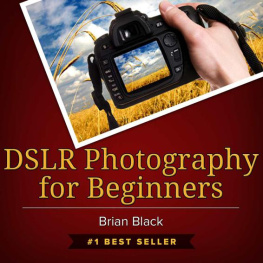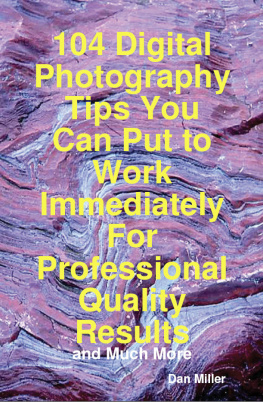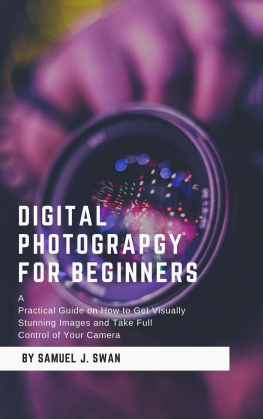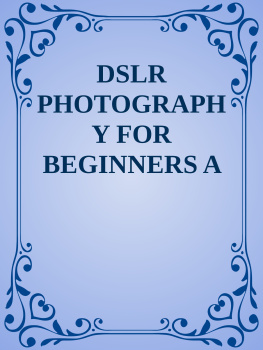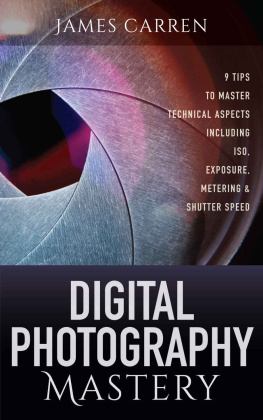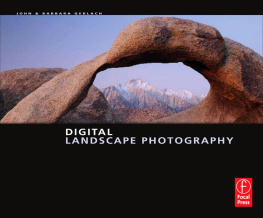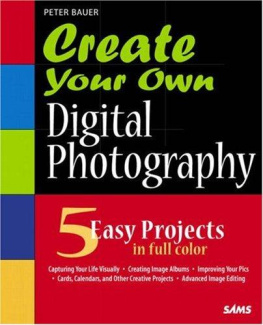DSLR Photography
for Beginners
The Right Way of Learning Digital SLR Photography
By Brian Black
Copyright 2013
Table of Contents
Digital Photography
Digital photography has become the standard today. Most cameras sold today are digital. Analog photography is on the way to disappearance except in a few niche applications. But what exactly is digital photography? In what ways is it better than analog photography? How did it earn its place of preeminence?
All photography captures an image by focusing light reflected from something in the world through a lens and recording that image in a medium. With old-fashioned analog photography, the medium was a film with light-sensitive chemicals that darkened or changed color when struck by light. The film was then processed in a darkroom using various chemicals that caused the image to appear in a negative with the colors reversed and then light was beamed through the film onto light-sensitive paper which was also exposed to chemicals to produce a print. The process was time-consuming and included many points where mistakes were possible. It was expensive in terms of materials and labor both, but until the advent of digital photography, it was the only way that photographs could be taken, developed, and preserved.
Instead of this analog process, digital photography focuses the light from the lens onto an array of electronic light sensors hooked up to a computer processing chip to create a digital image and store it in digital memory. The stored image can be seen immediately on the cameras screen, transmitted to other devices for storage or further processing, and digitally published on the Internet.
The advantages of digital over analog photography are enormous. Theres no danger of losing photographs by accidentally exposing film, or of making a mistake in the development process that ruins the photo forever. You can see the results of your efforts immediately, and know if you need to retake a shot, as opposed to waiting hours or days before the results are available. Theres no delay while the photos are processed; they can be checked at once. That means you dont have to take as many shots in order to be reasonably sure of a good one, and in addition each photo you take costs essentially nothing no film, no development chemicals, no printing paper or slide materials. Digital photography saves both time and money by making the process more efficient and less wasteful.
You can make perfect copies of a digital photograph, whereas copies of analog photographs lose fidelity the more times copies of copies are made. Digital photographs are taken in exactly the format you will need for digital publication or for using the photos in a graphic design program. Theres no guesswork involved in moving from one medium to another, no wondering how a photo that looks great in an eight by ten glossy will appear when rendered into newsprint.

Whats more, with digital photography theres no need to worry about whether youre using the right kind of film. You dont need to have supplies of various speeds of film for different shooting conditions and purposes. Any type of image in any type of light can become a photo in your cameras digital memory, provided its within the parameters your camera lens, aperture, and shutter speed can handle, one size fits all.
Finally, digital photography allows some versatile automatic controls to be implemented for things like focusing and exposure control, some of which well discuss in a bit.

Are there any disadvantages to digital photography? Yes, there is one potential disadvantage. Just as analog music (vinyl recording) can give you a better sound at the high end of playback than digital music, so with analog photography you can potentially achieve a finer grade of visual art than with digital photography. Thats because digital photography breaks the image into discrete bits (pixels) and relies on the brain of the person viewing them to generate a whole picture out of the bits. The greater the density of the digital image, the more complete and true-seeming the image will be, but there is always a limit at any given level of refinement and technology. Analog photography, however, has no limit to how perfectly it can render an image.
Taking advantage of this inherent superiority of analog photography requires the best cameras and equipment, though, and as digital photography continues to advance it reaches a level of refinement where the eye and brain simply cant tell the difference. Moreover, todays methods of publication are all digital, which means that even though you can (conceivably) produce a better photograph using analog methods, it wont be any better by the time its published. For just about all practical purposes, digital photography is superior, and thats why its rapidly becoming the way things are done for professional and casual photography alike. Today, digital photography can be produced that is extremely high in quality. This is especially possible through the use of high quality cameras and lenses, among which most of the best ones use a technique called single-lens reflex (SLR) photography , and that of course is what this book is about.
If your interest in photography goes beyond pointing a camera and taking snapshots of the family on vacation, hopefully this little e-book will give you some information that can help you. Well discuss the reasons why SLR is the way to go for quality photography. Well go over the elements of photo composition. Well discuss aperture, shutter speed, and ISO sensitivity, and what each of these means in terms of photo quality and effects. Well describe the different kinds of lenses you can buy for and use with your digital SLR camera. Well go over the different common file formats for saving your pictures to memory, and a little on graphics arts programs and why its important to learn how to use one, and the basic rules of making sure you dont lose your photos after youve taken them. This book isnt a complete manual of the photographers art, but its an introduction that should give you an idea of what youre getting into.
Why SLR?
SLR stands for single-lens reflex. The term refers to a type of viewfinder on a camera. A standard viewfinder is placed beside or above the camera lens and focuses separately from the lens. The image you see in the viewfinder is never precisely what the camera sees or what will appear in your photo, although with a well-designed viewfinder it can come very close.

A typical single-lens reflex camera
A single-lens reflex camera has no viewfinder technically so called. Instead, it uses a mirror to bend and redirect some of the light from the lens through an eyepiece so that the photographer is looking right through the lens itself. What you see is exactly what you get. There are enormous advantages to SLR photography.
The biggest advantage is that an SLR allows you to change lenses in the camera. You can use a close-up lens, a telephoto lens, and various lenses with different aperture settings to capture just the image you want. With a viewfinder, this isnt easy to do, because the viewfinder is made to match a particular lens and will present a much more distorted image if you change the lens. With an SLR camera, because the image you see is always coming from the lens, its always true to the lens, no matter which lens youre using.
Next page
